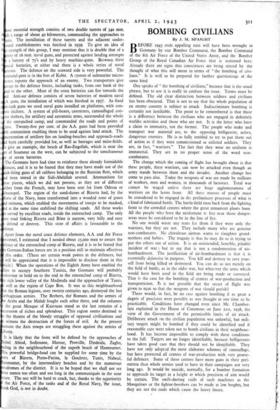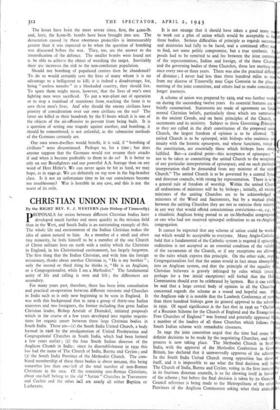BOMBING CIVILIANS
By J. M. SPAIGHT
BEFORE 1943 ends appalling ruin will have been wrought in Germany by our Bomber Command, the Bomber Command of the 8th Air Force of the United States Army, and the Bomber Group of the Royal Canadian Air Force that is stationed here. Already there arc signs that consciences are being stirred by the thought of what this will mean in terms of " the bombing of civi- lians." It is well to be prepared for further questionings of the same kind.
One speaks of " the bombing of civilians," because that is the usual
phrase, but to use it is really to confuse the issue. Terms must be defined. The old clear distinction between soldiers and civilians has been obscured. That is not to say that the whole population of an enemy country is subject to attack. Indiscriminate bombing is certainly not justifiable. The point to be remembered,is that there is a difference between the civilians who are engaged in definitely warlike activities and those who are not. It is the latter who have a claim to immunity, not the former. The people who make and transport war material arc, to the opposing belligerent, active, dangerous enemies. He is as fully entitled to try to put them out
of action as if they were commissioned or enlisted soldiers. They are, in fact, " warriors." The fact that they wear no uniform is immaterial. They are in no proper sense of the word non- combatants.
The change which the coming of flight has brought about is that these people, these warriors, can now be attacked even though an army stands between them and the invader. Another change has come to pass also. Today the weapons of war are made by millions of workers, men and women, in thousands of factories. Total war cannot be waged unless there are huge agglomerations of warriors on the home front. All these masses of people must be considered to be engaged in the preliminary processes of what is a kind of fabricated battle. The battle-field runs back from the fighting front to the crowded centres where the great armament plants hum. All the people who have the misfortune to live near those danger- areas must be considered to be in the line of fire.
No one would waste any tears for them if they were only the warriors, but they are not. They include many who are genuine non-combatants. No chivalrous airman wants to slaughter grand- mothers and babies. The tragedy is that he may do so in trying to put the others out of action. It is an unintended, horrible, pitiable incident of war ; but to say that is not a condemnation of air- bombardment. The justification of air-bombardment is that it is essentially defensive in purpose. You kill and destroy to save your- self from being killed or destroyed. You can do so not merely on the field of battle, as in the older war, but wherever the arms which would have been used in the field are being made or conveyed. That is the case for the bombing of centres of war-production and transportation. Is it not possible that the secret of flight was given to man so that the weapons of war should perish?
There would, in fact, be no case against bombing if as great a degree of precision were possible as was thought at one time to be practicable. Conditions have changed even since Mr. Chamber- lain explained in the House of Commons on June 21st, 1938, the view of the Government of the permissible limits of air attack. Deliberate attack on the civilian population was unlawful, but mili- tary targets might_ be bombed if they could be identified and if reasonable care were taken not to bomb civilians in their neighbour- hood. It has become impossible to comply with these conditions to the full. Targets are no longer identifiable, because belligerents have taken good care that they should not be identifiable. They have not only adopted the most elaborate schemes of camouflage, but have protected all centres of war-production with very power- ful defences. Some of these centres have more guns in their peri- meters than whole armies used to have in their campaigns not very long ago. It would be suicide, normally, for a bomber formation to approach its target at a height at which precision of aim would be certain. The swift7darting raids of such machines as the Mosquitoes or the fighter-bombers can be made at low heights, but they are not the raids which cause the heavy losses.
The losses have been the more severe since, first, the 4,000-lb. and, later, the 8,000-lb. bombs have been brought into use. The devastation caused by these enormous projectiles is immeasurably greater than it was expected to be when the question of bombing was discussed before the war. They, too, are the answer to the intensification of the defence. The smaller bombs were found not to be able to achieve the object of wrecking the target. Inevitably their use increases the risk to the non-combatant population. • Should not bombing of populated centres then be abandoned? To do so would certainly save the lives of many whom it is no advantage to a belligerent to kill; it is indeed a disadvantage, for, being " useless mouths " in a blockaded country, they should live. To spare them might mean, however,' that the lives of one's own fighting men were sacrificed. To put a war-plant out of operation or to stop a trainload of munitions from. reaching the front is to save these men's lives. Anti why should the enemy civilians have priority of consideration over our own civilians on the sea? The latter are killed in their hundreds by the. U-boats which it is one of the objects of the air-offensive to prevent from being built. It is a question of setting one tragedy against another, and bombing, it should be remembered, is not unlawful, as the submarine methods of the Germans certainly are.
Our own town-dwellers would benefit, it is said, if " bombing of civilians " were discontinued. Perhaps so, for a time ; but does anyone suppose that the Germans would not resume their attacks if and when it became profitable to them to do so? It is better to rely on our Beaufighters and our powerful A.A. barrage than on any word of Herr Hitler's. We can never again be hit as hard, we may hope, as in 194o-41. We are definitely on top now in the big-bomber class. Is it not an unfortunate time to let our consciences become too troublesome? War is horrible in any case, and this is not the worst of its evils.



























 Previous page
Previous page